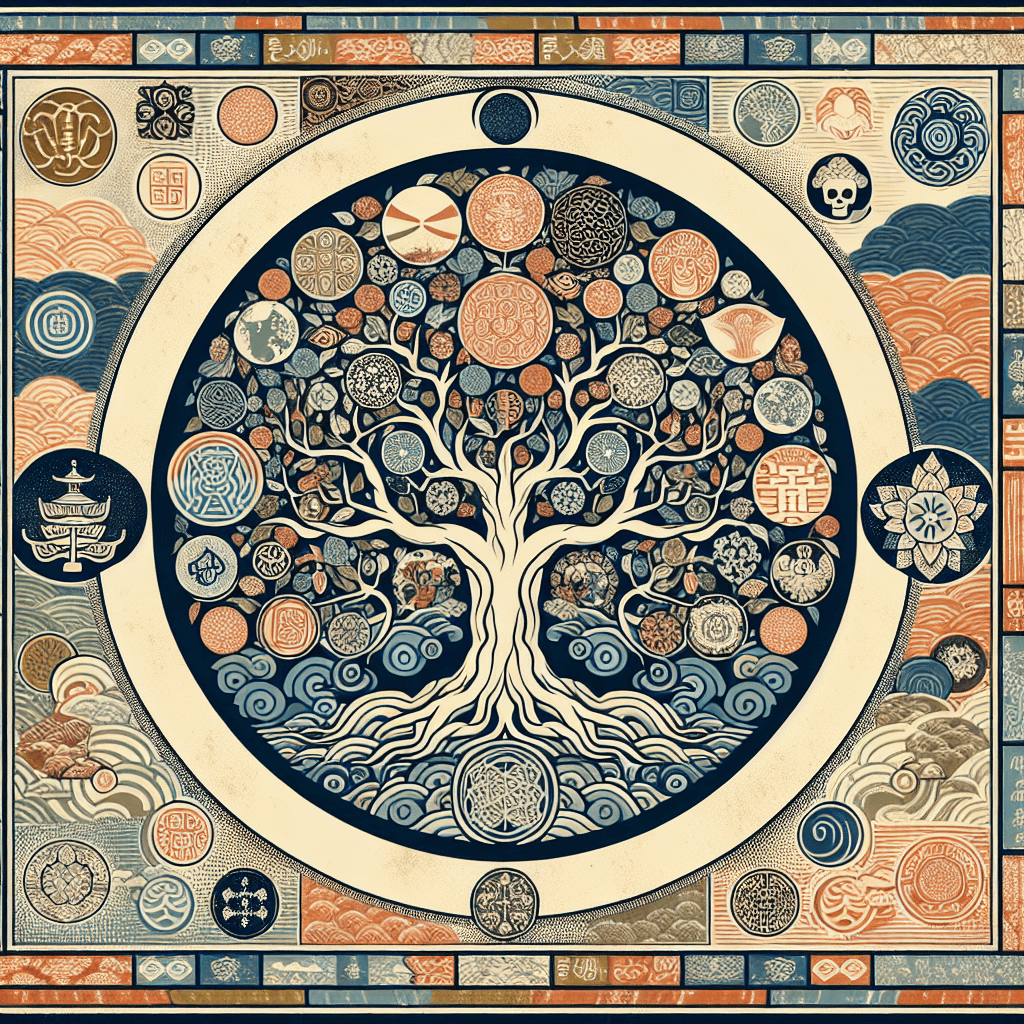

syndu | Dec. 15, 2024, 10:59 a.m.

Global Perspectives on the Tree of Life
Introduction
The Tree of Life is a profound symbol associated with interconnectedness, growth, and the cyclical nature of existence. Though deeply rooted in Kabbalistic tradition, it finds resonance in various cultures globally, encompassing diverse interpretations and cultural significations. This exploration delves into its representation across different cultural perspectives, highlighting its universal appeal and rich thematic layers.
The Tree of Life in Kabbalistic Tradition
Within Kabbalah, the Tree of Life serves as a central mystical symbol. It represents the divine process of creation and progression toward spiritual enlightenment. Constructed of ten sephirot—or spheres—it symbolizes different divine attributes and stages of spiritual development, guiding adherents on a path towards understanding the universe and achieving divine connection.
Norse Mythology: Yggdrasil
Yggdrasil, in Norse mythology, embodies the Tree of Life concept as a gargantuan ash tree interlinking the nine worlds of the cosmos. Serving as the axis mundi, or the universal center, Yggdrasil is home to several creatures and deities, epitomizing the interconnectedness and cyclical nature of life amidst its roots and branches stretching across realms, including the heavens and the underworld.
Hindu Tradition: Kalpavriksha
In Hindu beliefs, the Tree of Life is often depicted as Kalpavriksha, a sacred, wish-fulfilling tree granting all desires, symbolizing abundance, fertility, and prosperity. This tree serves as a conduit for understanding life's interconnected nature and the divine, often portrayed in Hindu art and texts as a source of spiritual nourishment and enlightenment.
Celtic Symbolism: The Crann Bethadh
Known as the Crann Bethadh in Celtic tradition, the Tree of Life expresses harmony and balance in nature, as well as the connection between the earthly realm and the heavens. Celts regarded trees as sacred, housing the spirits of ancestors. The Crann Bethadh symbolizes strength, wisdom, and longevity, typified by its intertwined branches and roots illustrating the interconnectedness of life.
The Tree of Life in African Traditions
In various African cultural contexts, the Tree of Life—often associated with the baobab tree—represents life, fertility, and protection. This enduring tree, known for providing shelter, food, and water, is venerated as a sacred entity, capturing life's resilience and interconnectedness. Its symbolic value extends to serving as a community's gathering place, representing unity and continuity.
Modern Interpretations and Global Influence
Today, the Tree of Life maintains its role as an inspirational and unifying symbol worldwide. Adopted by various spiritual and philosophical movements, including New Age and Neo-Pagan traditions, it embodies personal growth, spiritual awakening, and a profound sense of interconnection. As a lasting motif in art, literature, and popular culture, it highlights themes of unity, growth, and the eternal life cycle.
"The Tree of Life is a universal symbol that transcends cultural and religious boundaries, offering a rich tapestry of meanings and interpretations."
Conclusion
The Tree of Life's symbolism crosses cultural and religious boundaries, presenting a mosaic of meanings and interpretations. Whether filling a mystical role in Kabbalah, serving as a cosmic axis in Norse legend, or symbolizing prosperity in Hindu culture, the Tree of Life continues to connect and inspire across global societies. This exploration unveils our shared longing for understanding, connection, and spiritual growth, emphasizing our intrinsic interconnectedness and potential for transformation and creation.